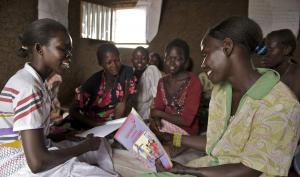Ban urges focus on adolescent girls to reduce maternal mortality
To triumph over maternal mortality, initiatives must focus on adolescent girls, Secretary-General Ban Ki-moon said, ones that allow them to go to school, marry whom they choose, shield them from harmful traditional practices and provide them with appropriate family planning services.

Young girls attend Adolescent Girls’ Club in Gudele neighbourhood on the outskirts of Juba in the South Sudan.
“When an adolescent girl is safe from harm and able to choose when to bear children, she can be saved from HIV infection, haemorrhage, obstetric complications such as obstructed labour and fistula, and death,” Mr. Ban told an audience in Nairobi, Kenya, at an event on ending maternal mortality.
Reducing maternal mortality by three-quarters and providing universal access to reproductive health by 2015 has been one of Millennium Development Goals (MDGs) with the slowest progress.
“Even though we have seen advances in recent years, too many women still die in childbirth or from complications related to pregnancy,” Mr. Ban said. “Most of these deaths are preventable.”
He noted that “a little investment in simple solutions”, which can range from basic midwife training for women in villages to motorcycle ambulances in remote rural areas, can go a long way.
“Women need a safe environment to deliver with the assistance of skilled birth attendants,” the Secretary-General said.
The Every Woman Every Child initiative, which he launched in 2010 for this reason, is a global effort to mobilize and intensify global action to save the lives of 16 million women and children and improve the lives of millions more.
Also in his speech, Mr. Ban highlighted the impact of harmful traditional practices, such as female genital mutilation, on the lives of adolescent girls. Some 20 per cent of girls in Kenya are cut in this “barbaric practice”, Mr. Ban said, while the proportion in Somalia is close to 98 per cent.
“African governments are united in opposing female genital mutilation, and the United Nations is giving priority to helping all communities abandon this practice,” he said.
His audience included Margaret Gakuo Kenyatta, First Lady of Kenya, who in January launched the 'Beyond Zero Campaign' to accelerate the implementation of Kenya's national plan towards improving maternal and newborns' lives, including through the elimination of new HIV infections among children in Kenya.
Mr. Ban said the UN has said it fully supports the Kenyan efforts, which include free maternity services, and which can serve as a “role model for the rest of Africa”.
Mr. Ban also met with Kenyan President Uhuru Kenyatta at the State House in Nairobi. He expressed solidarity with the people of Kenya in light of recent terrorist incidents, and his confidence in Mr. Kenyatta's leadership in maintaining national unity in the face of the security challenges.
The two leaders also discussed issues of regional peace and security, including the situations in Somalia in South Sudan where Kenya is helping to create sustainable peace, according to a UN spokesperson.
Mr. Ban also praised Kenya's rule in utilizing renewable energy sources, and discussed the new sustainable development agenda to follow the MDGs after 2015.
Source: UN News
- 458 reads
Human Rights
Ringing FOWPAL’s Peace Bell for the World:Nobel Peace Prize Laureates’ Visions and Actions

Protecting the World’s Cultural Diversity for a Sustainable Future

The Peace Bell Resonates at the 27th Eurasian Economic Summit

Declaration of World Day of the Power of Hope Endorsed by People in 158 Nations

Puppet Show I International Friendship Day 2020

